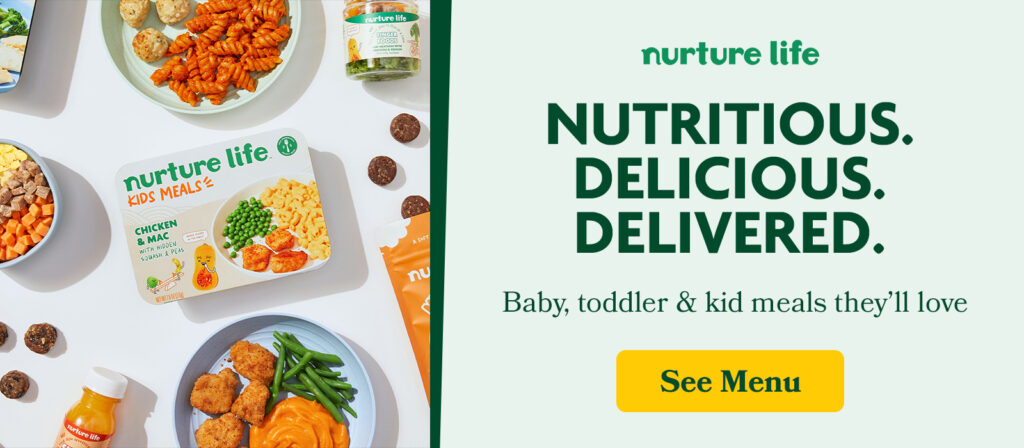Nutrition for Kids: Your Top 10 Kid Nutrition Questions Answered
Here at Nurture Life, we’re all about nourishing babies, toddlers and kids with wholesome foods at every stage of development. To make sure our freshly made meals provide the recommended balance of vitamins, minerals and nutrients, we routinely turn to the expertise of our pediatric registered dietitian, Lara Field, to ensure we provide the best nutrition for kids.
When she’s not collaborating with our chefs to build nutritious, age-appropriate menus, Lara takes questions from concerned parents and caregivers. You’ve asked—and she’s answered! Below you’ll find Lara’s responses to the 10 questions parents ask her most frequently about kids and nutrition.

Our Top 10 Questions About Nutrition for Kids
1. How much protein does my child need?
As a rule of thumb, you can determine your child’s recommended daily intake of protein (in grams) by taking his or her weight (in pounds) and dividing it in half. For instance, if your child weighs 40 pounds, he or she should consume about 20 grams of protein per day.
Protein is a common topic of concern for parents, especially because picky eating, teething and learning to chew can all affect a child’s protein consumption (or lack thereof). The truth, however, is that children’s bodies are small and require less protein than many parents fear. In most cases, you can meet your child’s protein needs by incorporating protein-rich dairy and whole grains into a well-balanced diet.
2. How much milk should my child drink? And what kind should it be?
Milk is a source of calcium, vitamin D and other important vitamins and minerals. However, it is also a source of confusion for many parents due to questions regarding the safety of antibiotics added to dairy products. Read our FAQs on kids and milk for in-depth responses to all of your children milk consumption questions.
- Read More: Should Kids Take Vitamins?
3. Is it okay to give my child sweets?
Sweets taste good, but you can definitely have too much of a good thing. Because taste preferences are formed at a young age, repeated exposure to sweets can cause your children to develop a preference for only sweet foods.
Rather than offer sweets on a daily basis, save them for special occasions. By making sweets an infrequent dietary choice, you’ll help your child develop healthier taste preferences from an early age.
4. Is it okay to give juice to my child?
There are many different kinds of juice—100% fruit, sweetened from concentrate and sweetened with natural sources of sugar—but even juice in its pure form is little more than a natural source of sugar.
It may be sweet and tasty, but juice has no fiber to keep us full. For this reason, experts suggest limiting juice to no more than 4 ounces per day, or better yet, reaching for a piece of fresh fruit instead.
5. My child only wants one type of food? What do I do?
Many parents exclaim that their children are “obsessed” or “addicted” to certain foods, but oftentimes these terms are far too strong. The real issue may simply be a lack of variety. No matter what the cause, only eating one type of food will definitely limit nutrition for kids.
Instead of presenting what you think your kids will eat, vary the dishes on the dinner table to encourage well-rounded taste preferences. Consider introducing one new item at a time so that the variety isn’t overwhelming! If your children continue to resist anything except the tried-and-true, check out a few further tips for navigating picky eating.
6. How do I get my kid to eat vegetables?
Try, try and try again! Kids often go through stages in taste preferences, changing their minds almost daily about foods they love and hate. It’s completely normal for your child to enjoy a certain food and then say, “No way!” the very next day.
To get your kids to eat more vegetables, start by making them routinely available. Keep veggies out at mealtime—if they see it, they’re more likely to eat it! Also consider taking a poll of which veggies are generally accepted, and then keep them on hand.
7. Is it okay to hide veggies in my kid’s meals?
At various stages of their lives, our children may be more or less willing to accept the foods we want them to consume. If veggies are simply a no-go at this point, it may be better to blend them directly into well-accepted dishes. In fact, some of Nurture Life’s most popular meals incorporate hidden veggies, like our wholesome mac and cheese with smoothly blended cauliflower.
That being said, we also think it’s important to be transparent with our kids about what they’re eating. Before going straight to sneaking, first try switching to a few of our favorite kid-friendly veggies, like spinach, sweet corn and peas.
8. When can I offer peanut butter to my child?
Introducing allergens such as peanuts can be very confusing for parents due to the enormous rise in food allergies in children. Recent research has changed our practice regarding the introduction of potential allergens, with the latest guidelines recommending peanut introduction between 4–6 months of age.
9. Is it okay to give the same foods every day if they’re healthy?
You’ve heard that “variety is the spice of life,” and this phrase definitely applies to nutrition for kids. Healthy eating means more than just adequate vitamins and minerals; it also calls for a balance of fiber, complex carbohydrates, essential fats and protein. Instead of offering the same foods every day, it’s best to aim for balance and variety.
If a jam-packed schedule or limited local grocery selection makes it difficult to create variety in the kitchen, consider alternating homemade meals with Nurture Life’s freshly made meals for babies, toddlers and kids. Our wholesome dishes are based on USDA MyPlate guidelines, and they’re an easy way to vary the nutrients on your child’s plate.
10. Does my child need snacks?
Snacks are typically overemphasized in childhood. Giving too many snacks can cause your children to feel full at mealtime, which can throw their eating schedule off balance and may also be confused with picky eating. If your kids need something to tide them over to the next meal, offer healthy snacks like fruit or vegetables, which are easy to digest and full of essential nutrients.
Still have questions about well-balanced nutrition for kids? Don’t hesitate to contact Nurture Life for additional guidance on how to meet your kids’ unique nutritional needs at every age.


